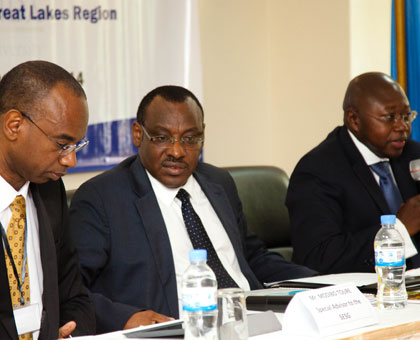Infrastructure such as roads, market stalls and abattoirs should be set up on DR Congo borders to support informal trade with its neighbouring countries in a bid to reduce militia activities, officials have said.


Infrastructure such as roads, market stalls and abattoirs should be set up on DR Congo borders to support informal trade with its neighbouring countries in a bid to reduce militia activities, officials have said.
This was observed yesterday in a meeting on the implementation of the UN Secretary-General’s Peace, Security and Cooperation Framework for DR Congo and the Great Lakes Region.
The meeting was hosted in Kigali and attracted participants from the region and senior officials from UN and its affiliated organisations, who sought a more impactful intervention in DRC’s peace-building process.
Finance and Economic Planning minister Claver Gatete told the meeting that supporting informal cross-border trade is the most realistic approach to lasting peace, since it occupies Congolese with economic activities and prevents them from joining the militia groups operating in DR Congo.
"Achieving peace and security in DR Congo is important to the region and we have always discussed this issue amongst ourselves as leaders,” Gatete said.
"The citizens of DR Congo cannot wait for our deliberations on how to bring about lasting peace. They need support now. They need to be able to trade without disturbance or without the lure of joining militia groups.”
"We need to open up our borders to facilitate thousands of Congolese who cross over to Rwanda, Congo Brazzaville or Tanzania to sell goods. We can do this by developing cross border infrastructure such as good tarmac roads, abattoirs to ease the transportation of livestock and market structures,” the minister added.
Giving room for peace talks
Gatete, who was representing the Government of Rwanda, added that boosting economic activities on DR congo borders will give room to ongoing peace talks and bilateral negotiations.
Lamin Manneh, the UN resident coordinator, said DR congo has become the epicentre of conflicts in the region and as a solution, the UN Secretary-General’s Peace, Security and Cooperation Framework provides so far the best opportunity for durable peace.
"In the DR Congo and the wider Great Lakes Region, it is important that a more coordinated support by the UN system and other partners be provided to the peace and security framework immediately to allow it to gain traction,” Manneh said.
The Framework agreement for DR Congo and the Great Lakes Region was signed by Heads of State in February last year Addis Ababa, Ethiopia.
Rwanda has been at the forefront of initiating bilateral ties with DR Congo. Most notable was in 2012, when Rwanda signed an agreement with DR Congo and Burundi to restore the Rusizi hydro power projects that have the capacity to supply 72 megawatts to all three countries.


